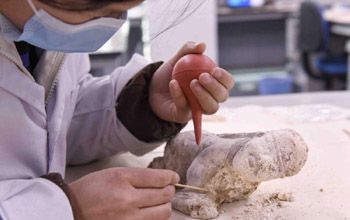LONDON, Feb. 28 (Xinhua) -- Despite their tiny brains, Bumblebees can be trained to score goals using a mini-ball, revealing unprecedented learning abilities, according to a study by scientists from the Queen Mary University of London (QMUL).
In the study, published in the February 23 issue of Science, researchers gave a group of bees a novel goal (literally): to move a ball about half their size into a designated target area to earn them a sugary treat.
To train the bees, scientists created three conditions: some observed a previously trained bee move the furthest ball to the center to gain reward, others received a "ghost" demonstration, where a magnet hidden underneath the platform was used to move the ball, and a third group received no demonstration, where they found the ball already at the center of the platform with reward.
"We wanted to explore the cognitive limits of bumblebees by testing whether they could use a non-natural object in a task likely never encountered before by any individual in the evolutionary history of bees," Dr. Clint Perry, joint lead author from QMUL's School of Biological and Chemical Sciences, told Science Daily.
Scientists found bees that observed demonstration of the technique from a live or model demonstrator learned the task more efficiently than did bees observing a "ghost" demonstration or without demonstration.
Instead of copying demonstrators moving balls over long distances, some bees displayed their ability of innovative thinking and solved the task more efficiently, using the ball positioned closest to the target, even if it was of a different color than the one previously observed.
"It may be that bumblebees, along with many other animals, have the cognitive capabilities to solve such complex tasks, but will only do so if environmental pressures are applied to necessitate such behaviors," Olli J. Loukola, joint-lead author of the study, said in a press release.
Such unprecedented cognitive flexibility hints that entirely novel behaviors could emerge relatively swiftly in species whose lifestyle demands advanced learning abilities, should relevant ecological pressures arise, the study concludes.












